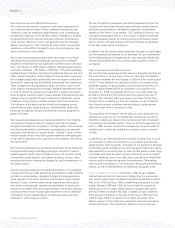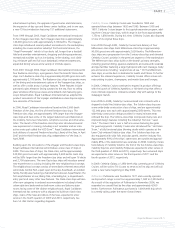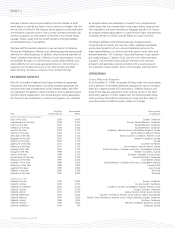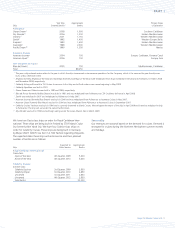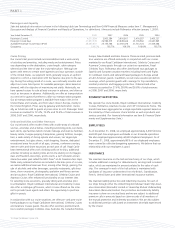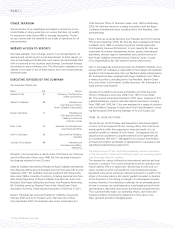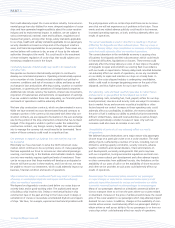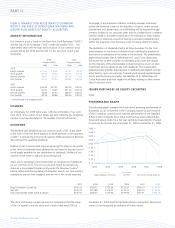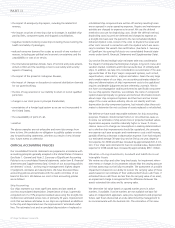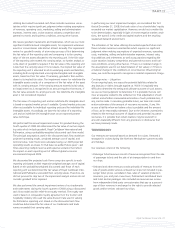Royal Caribbean Cruise Lines 2008 Annual Report Download - page 29
Download and view the complete annual report
Please find page 29 of the 2008 Royal Caribbean Cruise Lines annual report below. You can navigate through the pages in the report by either clicking on the pages listed below, or by using the keyword search tool below to find specific information within the annual report.
Royal Caribbean Cruises Ltd. 13
PART I
Under certain circumstances, changes in the identity, residence or hold-
ings of our direct or indirect shareholders could cause our common stock
not to be “regularly traded on an established securities market” within
the meaning of the regulations under Section 883. To substantially
reduce any such risk, in May 2000, our Articles of Incorporation were
amended to prohibit any person, other than our two existing largest
shareholders, from owning, directly or constructively as determined
for purposes of Section 883(c)(3) of the Internal Revenue Code and
the regulations promulgated under it, more than 4.9% of the relevant
class or classes of our shares. Under Liberian law, this amendment may
not be enforceable with respect to shares of common stock that were
voted against the amendment or that were recorded as abstaining
from the vote.
Also, it should be noted that Section 883 has been the subject of leg-
islative modifications in past years that have had the effect of limiting
its availability to certain taxpayers, and there can be no assurance that
future legislation will not preclude us from obtaining the benefits of
Section 883.
Taxation in the Absence of an Exemption under Section 883
of the Internal Revenue Code
If we, Celebrity Cruises Inc., or our ship-owning subsidiaries were to
fail to meet the requirements of Section 883 of the Internal Revenue
Code, or if the provision was repealed, then, as explained below, such
companies would be subject to United States income taxation on a
portion of their income derived from or incidental to the international
operation of our ships.
Because we and Celebrity Cruises Inc. conduct a trade or business
in the United States, we and Celebrity Cruises Inc. would be taxable
at regular corporate rates on our separate company taxable income
(i.e., without regard to the income of our ship-owning subsidiaries),
from United States sources, which includes 100% of income, if any,
from transportation that begins and ends in the United States (not
including possessions of the United States), 50% of income from
transportation that either begins or ends in the United States, and
no income from transportation that neither begins nor ends in the
United States. The legislative history of the transportation income
source rules suggests that a cruise that begins and ends in a United
States port, but that calls on more than one foreign port, will derive
United States source income only from the first and last legs of such
cruise. This conclusion is not free from doubt, however, because there
are no regulations or other Internal Revenue Service interpretations
of the above rules. In addition, if any of our earnings and profits
effectively connected with our United States trade or business were
withdrawn, or were deemed to have been withdrawn, from our United
States trade or business, those withdrawn amounts would be subject
to a “branch profits” tax at the rate of 30%. The amount of such earn-
ings and profits would be equal to the aforesaid United States source
income, with certain generally minor adjustments, less income taxes.
We and Celebrity Cruises Inc. would also be potentially subject to tax
on portions of certain interest paid by us at rates of up to 30%.
If Section 883 were not available to our ship-owning subsidiaries, each
such subsidiary would be subject to a special 4% tax on its United States
source gross transportation income, if any, each year because it does
not have a fixed place of business in the United States and its income
is derived from the leasing of a ship. Such United States source gross
transportation income may be determined under any reasonable
method, including ratios of days traveling directly to or from United
States ports to total days traveling, or of the lessee’s United States
source gross income from the ship (as determined under the source
rules discussed in the preceding paragraph, and subject to the assump-
tions and qualifications set forth therein) to the lessee’s total gross
income from the ship.
MALTESE INCOME TAX
Our Pullmantur ship owner-operator subsidiaries qualify as licensed
shipping organizations in Malta. No Maltese income tax is charged
on the income derived from shipping activities of a licensed shipping
organization. Instead, a licensed shipping organization is liable to pay
a tonnage tax based on the net tonnage of the ship or ships registered
under the relevant provisions of the Merchant Shipping Act. A com-
pany qualifies as a shipping organization if it engages in qualifying
activities and it obtains a license from the Registrar-General to enable
it to carry on such activities. Qualifying activities include, but are not
limited to, the ownership, operation (under charter or otherwise),
administration and management of a ship or ships registered as a
Maltese ship in terms of the Merchant Shipping Act and the carrying
on of all ancillary financial, security and commercial activities in con-
nection therewith.
Our Maltese operations that do not qualify as licensed shipping organi-
zations, which are not considered significant, remain subject to normal
Maltese corporate income tax.
UNITED KINGDOM INCOME TAX
The Brilliance of the Seas is operated by a company that is strategically
and commercially managed in the United Kingdom, which has elected
to be subject to the United Kingdom tonnage tax regime (“U.K. ton-
nage tax”). Companies subject to U.K. tonnage tax pay a corporate
tax on a notional profit determined with reference to the net tonnage
of qualifying vessels. Normal United Kingdom corporate income tax
is not chargeable on the relevant shipping profits of a qualifying U.K.
tonnage tax company. The requirements for a company to qualify for
the U.K. tonnage tax regime include being subject to United Kingdom
corporate income tax, operating qualifying ships, which are strategi-
cally and commercially managed in the United Kingdom, and fulfilling
a seafarer training requirement.
Relevant shipping profits include income from the operation of qualify-
ing ships and from shipping related activities. Our United Kingdom
income from non-shipping activities which do not qualify under the
U.K. tonnage tax regime and which are not considered significant,
remain subject to United Kingdom corporate income tax.
STATE TAXATION
We, Celebrity Cruises Inc. and certain of our subsidiaries are subject to
various United States state income taxes which are generally imposed
on each state’s portion of the United States source income subject
to federal income taxes. Additionally, the state of Alaska subjects an
allocated portion of the total income of companies doing business in
Alaska and certain other affiliated companies to Alaska corporate state
income taxes and also imposes a 33% tax on income from onboard
gambling activities conducted in Alaska waters. This did not have a
material impact to our results of operations for all years presented.



